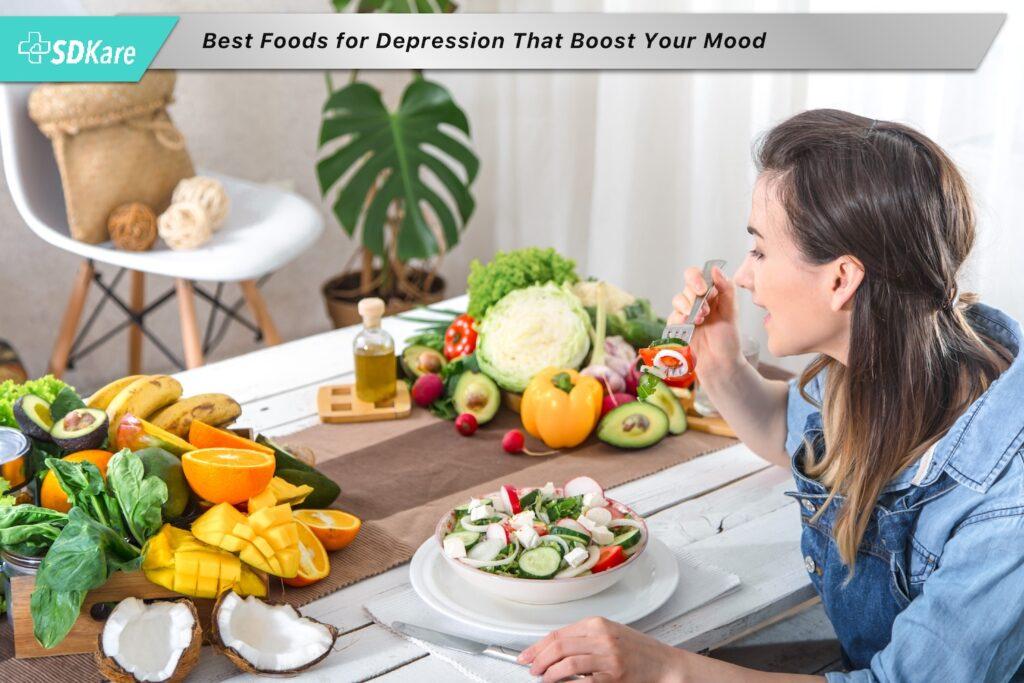In today’s fast-paced world, the occurrence of depression is on the rise. While medical help is crucial, incorporating the right foods into your diet can play a significant role in managing and improving symptoms. This article explores the best foods for depression that can boost your mood and contribute to overall mental well-being. It will not only help us have a better understanding of nutritional facts but it will also help us find the best foods to eat for depression.
Understanding the Link Between Diet and Depression:
Scientific studies have increasingly highlighted the complex connection between what we eat and our mental health. Moreover, consuming a balanced diet rich in specific nutrients can positively impact neurotransmitter function, hormonal balance, and inflammation levels—all of which are closely linked to mood regulation.
What are the Best Foods for Depression?
Addressing depression involves a holistic approach that includes lifestyle factors, exercise, and mental health support. While no specific food can cure depression, certain nutrients and foods may contribute to better mental well-being. Here are some foods that are often considered beneficial:
Fatty Fish:
- Why: Rich in omega-3 fatty acids, which play a crucial role in brain function.
- Examples: Salmon, mackerel, and sardines.
Berries:
- Why: Packed with antioxidants that combat oxidative stress and inflammation.
- Examples: Blueberries, strawberries.
Dark Leafy Greens:
- Why: High in vitamins and minerals, including folate, which is linked to mood regulation.
- Examples: Spinach, kale.
Whole Grains:
- Why: Complex carbohydrates provide a steady release of energy, stabilizing mood.
- Examples: Quinoa, brown rice, oats.
Lean Proteins:
- Why: Essential for neurotransmitter production, influencing mood.
- Examples: Chicken, turkey, tofu, and legumes.
Probiotics:
- Why: Support a healthy gut microbiome, linked to improved mental health.
- Examples: Yogurt, kefir, sauerkraut.
Vitamin D-Rich Foods:
- Why: Supports overall brain health and may reduce the risk of depression.
- Examples: Fatty fish, fortified dairy, egg yolks.
Nuts and Seeds:
- Why: Provide omega-3 fatty acids, magnesium, and other nutrients.
- Examples: Almonds, walnuts, chia seeds, flaxseeds.
Water-Rich Foods:
- Why: Hydration is crucial for optimal brain function.
- Examples: Watermelon, cucumber.
Dark Chocolate:
- Why: Contains flavonoids, caffeine, and serotonin precursors that may have mood-enhancing effects.
- Note: Consume in moderation and choose chocolate with a high cocoa content.
The Role of Omega-3 Fatty Acids:
One of the standout categories of foods that help with depression is those rich in omega-3 fatty acids. Fatty fish such as salmon, mackerel, and sardines are not only delicious but also packed with these essential fats. Incorporating these into your diet can contribute to improved brain function and reduced symptoms of depression.
Antioxidant-Rich Fruits and Vegetables:
Moreover, alongside omega-3 fatty acids, it’s essential to focus on consuming a variety of colorful fruits and vegetables high in antioxidants. Berries, such as blueberries and strawberries, are particularly rich in antioxidants that combat oxidative stress in the brain. Additionally, dark leafy greens like spinach and kale provide a wealth of vitamins and minerals, promoting overall cognitive health.
Whole Grains for Sustainable Energy:
Shifting our attention to foods that help with depression, and carbohydrates, opting for whole grains is crucial for sustained energy levels and mood stability. Additionally, whole grains like quinoa, brown rice, and oats contain complex carbohydrates that release energy slowly, preventing the rapid spikes and crashes associated with refined sugars. This steadiness in blood sugar levels can positively influence mood and help manage symptoms of depression.
The Impact of Lean Proteins:
Equally important in the quest for the best foods for depression is the inclusion of lean protein sources. Chicken, turkey, tofu, and legumes offer a protein-packed punch without the excessive saturated fats found in some red meats. Additionally, protein is essential for the production of neurotransmitters like serotonin and dopamine, both of which play vital roles in mood regulation.
Probiotics and Gut Health:
Shifting gears, let’s delve into the connection between gut health and mental well-being. Foods that fight depression, and probiotics, found in yogurt, kefir, and fermented foods like sauerkraut, contribute to a healthy gut microbiome. Additionally, emerging research suggests that the gut-brain axis plays a significant role in mood regulation, making these foods valuable additions to a depression-fighting diet.
Vitamin D is often referred to as the “sunshine vitamin” because our bodies produce it in response to sunlight. Incorporating foods like fatty fish, fortified dairy products, and egg yolks can help maintain optimal vitamin D levels. Consequently, this may potentially reduce the risk of depression and improve mood.
Nuts and Seeds for Nutrient-Rich Snacking:
When it comes to convenient and nutrient-dense snacks that support mental well-being, nuts and seeds take center stage. Almonds, walnuts, chia seeds, and flaxseeds are excellent sources of omega-3 fatty acids, fiber, and magnesium. Additionally, these nutrients collectively contribute to brain health, making them ideal for combating the effects of depression.
Hydration and Its Impact on Mental Well-being:
In the quest for the best foods for depression, it’s easy to overlook a simple yet crucial element of our diet—hydration. Moreover, staying adequately hydrated is essential for optimal brain function. Furthermore, dehydration can impair cognitive function and worsen symptoms of anxiety and depression. When it comes to the best foods for energy and mood and by having water-rich foods like watermelon and cucumber can contribute to overall hydration levels.
In conclusion, adopting a diet rich in the best foods for depression can be a proactive step towards managing and improving mood. From omega-3 fatty acids in fatty fish to the antioxidants in colorful fruits and vegetables, each nutrient plays a role in supporting mental well-being. Additionally, by making mindful choices in our diet, we can contribute to a holistic approach to mental health. So, let your journey to better mental well-being begin with the plate in front of you.




